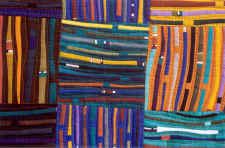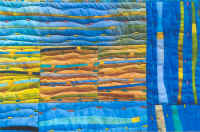 Can atheists be spiritual? I hope that after reading further you will be able to answer this apparently oxymoronic question with a comfortable “YES”.
Can atheists be spiritual? I hope that after reading further you will be able to answer this apparently oxymoronic question with a comfortable “YES”.
The problem, of course, is how you define spiritual. I know, it sounds like Clinton saying “It depends on what the meaning of ‘is’ is.” So why dwell on this confusing word “spirit†when we believe there is no god? Because it’s a useful term with resonances in great and wise traditions. The problem with atheism is that it tends to throw the baby out with the bath water. My intention is to freshen and balance spirit’s meaning between the wisdom of ancient intuitive thinking and current knowledge. I also like the idea of reclaiming it for modern secular use.
 We often use the word spirit in secular vernacular to mean a general quality of a person’s demeanor: “He’s in poor spirits.” We all know exactly what it means. There is no need for an atheist to refute its validity. We know that something is causing that “poor spirit”. You could argue it’s the same as saying “He’s an unhappy person right now.” But what is unhappy about him? Is it his mind, his body? The word spirit fits because it describes something else, neither mind nor body alone. I propose that spirit is a relationship or connection between parts, between mind and body, between self and other. This idea can be expanded further.
We often use the word spirit in secular vernacular to mean a general quality of a person’s demeanor: “He’s in poor spirits.” We all know exactly what it means. There is no need for an atheist to refute its validity. We know that something is causing that “poor spirit”. You could argue it’s the same as saying “He’s an unhappy person right now.” But what is unhappy about him? Is it his mind, his body? The word spirit fits because it describes something else, neither mind nor body alone. I propose that spirit is a relationship or connection between parts, between mind and body, between self and other. This idea can be expanded further.
Fear seems to be a primary reason people turn to religion. I have many fears. I fear failure. I fear rejection. I fear being judged wrongly by others. I fear hate from others. I fear loneliness. Believing in a god gives solace that you are never alone, that you are always loved. We all suffer from the misconception that we are separate from others and that we have to “fit in” to be accepted. So how do we deal with the issue of fear of loneliness?
 Individuality is the hallmark of free society. We are encouraged to be unique, new, daring, different. But something gets lost in all that separateness: our connection to each other. Think for a moment of the worst pain you have ever suffered. With a little imagination, you can picture someone else on earth suffering as much or much worse. Imagine the love you wish for, then know that someone else suffers the same need. Keeping these little awarenesses close to the heart through a day sooths the emptiness of separateness. With individualism as the pinnacle of freedom, we tend to forget these simple connections. Boundaries of thought between people create loneliness, not being alone.
Individuality is the hallmark of free society. We are encouraged to be unique, new, daring, different. But something gets lost in all that separateness: our connection to each other. Think for a moment of the worst pain you have ever suffered. With a little imagination, you can picture someone else on earth suffering as much or much worse. Imagine the love you wish for, then know that someone else suffers the same need. Keeping these little awarenesses close to the heart through a day sooths the emptiness of separateness. With individualism as the pinnacle of freedom, we tend to forget these simple connections. Boundaries of thought between people create loneliness, not being alone.
Expanding connections further. I once listened to all 9 symphonies of Beethoven on day, beginning in the afternoon and continuing until late evening. As my fatigue encroached from so much listening, my mind opened up to another level. I stopped thinking about the music and started just experiencing it. That’s when Beethoven came rushing deep into my being. The last three symphonies, Nos. 7, 8 and 9, were truly spiritual experiences, poetic inspirations, moments of connection between history, culture, music, myself and my muse. Beyond a connection to something there was also a liberation from something. Boundaries became less distinct between me and the world. I felt as if I were in Beethoven’s head, hearing and writing them with all their meaning and depth and quality.
 So it is with the spirit of living. It is neither yours nor something separate from you, but an interaction, a relationship between you and the world around you. It is a coaxial cable connection to the universe, a direct link to all that is and is possible.
So it is with the spirit of living. It is neither yours nor something separate from you, but an interaction, a relationship between you and the world around you. It is a coaxial cable connection to the universe, a direct link to all that is and is possible.
The problem is, our natural spirit is often damaged, or at least obscured. The various trappings of life’s maintenance, cultural oppressions, poor upbringing, physical distractions, ego, desire and self-deception cause myriad malfunctions and disconnections. It’s as if the “software†to life is damaged by various “virusesâ€. The usual suspects are judgment, self-deception, hubris, attachment, fear and ignorance. Add to that habits of unclear thinking and living, or the misfortune of traumatic experience, and one faced a veritable minefield of obstacles to experiencing a clear spirit. Luckily, science, psychology and modern meditative self-examination are valuable tools for clarifying spirit. So are the connections experienced through art, poetry, music and the beauty of nature.
But how do we find time to do all this growing in a short life? The atheist’s sense of the finality of death is a problem. I don’t really know if I fear the end of my life. But I want to accomplish so much before then. How can we be happy if we’re always in a hurry to live a full life before we “disappear”?
 Here again that illusion of separateness comes into play. Thich Nhat Hahn brilliantly used the metaphor of a cloud. The fact is, a cloud does not disappear when it evaporates into humidity or falls as rain. True, the cloud as it was is gone. Its beauty or inspiration or perhaps the shade it offered from the sun is no longer. But the raw matter of the cloud still exists in a different form. So it is with us. We cease to be a living human. But our energy still exists. These observations are small comfort to those whose egos cling to a singular, separate identity. But personally, I feel good knowing that I will continue in some other form.
Here again that illusion of separateness comes into play. Thich Nhat Hahn brilliantly used the metaphor of a cloud. The fact is, a cloud does not disappear when it evaporates into humidity or falls as rain. True, the cloud as it was is gone. Its beauty or inspiration or perhaps the shade it offered from the sun is no longer. But the raw matter of the cloud still exists in a different form. So it is with us. We cease to be a living human. But our energy still exists. These observations are small comfort to those whose egos cling to a singular, separate identity. But personally, I feel good knowing that I will continue in some other form.
Most spiritual traditions refer to something which encompasses All. With growing awareness, we begin to know that we are a part of something much larger than ourselves. We can sense and fathom a connection and unity between all things. I timidly dare to call this great spirit as an extension of the individual one. Here again, a hybrid relationship of scientific humanism with intuitive spirituality can lead us forward. We know that we came from and will return to some common pool, since our matter only changes forms. So, we are from it and of it and will return to it. Scientifically, the atoms are barely differentiated between earth, life and sky. Boundaries blur further.
 The wisdom of Buddhism teaches that our suffering is caused by attachment to things, time and ego. Ironically, Buddhism’s ultimate goal is to break the illusion of separateness by dissolving the illusion of ego. Things, time and ego are necessary to life, but damaging to spiritual health.
The wisdom of Buddhism teaches that our suffering is caused by attachment to things, time and ego. Ironically, Buddhism’s ultimate goal is to break the illusion of separateness by dissolving the illusion of ego. Things, time and ego are necessary to life, but damaging to spiritual health.
Taoist thinking highlights the unity of opposites: good cannot exist without bad, self without other. Again, relationships. These empirical truths are often elusive to our clinging, categorizing natures. My intention in calling these elusive goals spiritual is to get beyond the clunkiness of analytical thinking and begin to gain a deeper sense of intuition and feelings. Our lives are empty without them.
Spirit is a poetic relationship between awareness and experience, between knowledge and intuition, identity and mystery, connection and separateness. When we embrace our spiritual gifts, our humanist natures can blossom. Who needs god for that?
Like the beautiful quilts photos dotting this article, the connections and relationships between various parts gives rise beauty and meaning.
All quilts photos from the collection The Linear Series by Carol Taylor. For further information, please go to Carol Taylor Quilts.

I’m glad I had the chance to read this blog entry. I run into barriers sometimes more traditional folks who don’t understand what I mean by spiritual if I reject a world of Spirit separate and distinct from the one we normally inhabit. But there’s really no need for a metaphysic or even a concept of G!d to be spiritual. It’s a feeling, a perception, a way of relating to the world around us that can be quite beautiful and powerful. Sometimes I find the metaphysical language can be helpful, but only when treated much as we would the id, ego, and superego, as a map or construct to help us navigate our own selves.
Malachi- Thank you for stopping by to read and comment. I agree with your point about metaphysical language being used as a “construct” to help us navigate our selves and reality.
Language in general is a guide, a tool, not a repalcement for reality.
Pingback: The Green Atheist » Humanist Symposium V.5
This was a great read. I’ve often remarked that spirituality can exist and even thrive within the atheist and the skeptic. I find spirituality in the wonder and awe of the universe and any time I take a moment to consider the vastness and the volume of the universe. The number of grains of sand on a single beach; the number of individual stars in the sky; the number of individual *particles* in these stars; or even just the aesthetic effect of viewing a sunset or a reflection on a calm lake. And on, and on.
I don’t need to believe that a god was responsible for these things to be completely beside myself in wonder and awe at their complexity and beauty.
Ylooshi- Thanks for stopping by and commenting. Wonder and awe are transformative events for the psyche, connections. Like you I feel moved by the stars, particularly while looking at the Mikly Way.
When I was 9, I used to look at the moon during the day, when you can tell it’s a hunk of rock. I would awe that it “floated” in the sky, that we were just on another rock.
This essay by D. Midbar, which explores Atheist Prayer as a new spiritual paradigm is a fascinating approach to the problem by a writer who is unconditionally atheist and “spiritual.”
http://atheistprayer.blogspot.com
The work is in the tradition of Don Cupitt, I believe, another atheist theologian. Check it out.
Thanks for this – adding you to my blogroll.
@wonderment, I’m not sure that someone who writes “We atheists can experience the divine presence so intensely that it doesn’t matter if God exists or not” can be said to be “unconditionally atheist.” The word that comes more to my mind is “confused.”
Pingback: New humanist blogroll at The Seed Lifting Up
Zach,
Well, maybe Midbar is confused, but you’re not adding much to the clarity by taking the quote out of context. Here’s how it appears (more completely) in the text at http://atheistprayer.blogspot.com
“We atheists can experience the divine presence so intensely that it doesn’t matter if God exists or not. And he does not.
Atheists can live the religious experience as authentically as anyone before us ever has. Perhaps more authentically, for we know the truth about God: that there is none.
Through prayer, the medium of grace, we can experience the holiness of the God that might as well exist, but doesn’t.”
Seems Pretty mushy. Dualism. Jealous of those who claim to be “spiritual”? I am just as spiritual as thou, perhaps moreso.
I sayso.
I am interested in why anyone –especially an atheist–wants to make claims for some form of spirituality. The illusion of the “great spirit” into which things somehow merge.
The clunkiness of analytical thinking? Or the mushiness of “deeper intuition”. Does this mean anything: “Spirit is a poetic relationship between awareness and experience, between knowledge and intuition, identity and mystery, connection and separateness. When we embrace our spiritual gifts, our humanist natures can blossom.”
Oh give me a break. Recyled Deepak Chopra.
degustibus- I am sure your condescending cynicism gives you a rush of power. Wrapped up in golden strings of logic, which have a life of their own, your cynicism is a self-perpetuating high.
I have never believed in any sort of god. But yes, I do yearn for a sense of wholeness and peace from which I can be more beneficial to the world. I believe that that yearning is good and natural and human.
My language and thinking may be mushy. But I know the goals intended by this article are not invalid.
wonderment- interesting stuff; the god with no name. Sounds like some of the mystical Jewish thinking I’ve seen, like Abraham Joshua Heschel’s “I asked for Wonder”. Thanks for the link. I noticed your name is also linked there. Did you write that article?
Zach- thanks for stopping by. I’ll check out your blog.
Thanks Garnet – just as FYI I think I left my personal blog address above (evolte.org) but it was actually my Quaker blog (trackback below) I was referring to. Gotta consolidate those blogs somehow…
Pingback: Green Oasis » Can Atheists be Spiritual?
I was alot more spiritual as an atheist than I ever was raised as a christian. Becoming an atheist and rejecting the image of god that was put upon me by others was an important step in my own spiritual growth. I’m now not an atheist because I’ve had my own experience of god. But I see atheism as closer to the truth about god than christianity for example. I do agree about the throwing the baby out with the bath water. I have noticed that alot of atheists throw out all spirituality as a rejection of christian religion.
David- Your comment has reassured me I am not nuts!! You see the paradox and understand the “un-nameable” quality of a spiritual experience. Thank you,
D
Hi Garnet,
This is an excellent post. It’s refreshing to read of other atheists who are spiritual for similar, if not the same, reasons as I.
It has been so obvious (and comfortable to me) since I came to this decision of what I believe in early adolescence that the concept of spirituality need not be equated with a belief in God!
I’ve enjoyed reading several articles on your blog that I didn’t have time to comment on. I’m pleased to see you’re still expressing yourself. It’s always a treat to drop by.
Best,
Gel
HI GEL- How are you? Thanks for stopping by and commenting. I’m glad you are still thriving and blogging. Your art is more beautiful than ever, more clear and spiritual.
I noted your other art blog link and will link to both.
take care,
David
Excellent essay! Do you mind if I reprint it on my website? Don
( http://www.beachpeople.us )
don- Sure, I’d be happy to have you reprint it. Do you mind also linking it back here? thanks, David
Pingback: Can Atheists Be Spiritual? : 40 Year Old Atheist
Absolutely fantastic read, David. I think you said this with a wonderful spirit! 😉
Great stuff you have here and what an interesting post. You really put your heart into it which is rare on the internet these days.